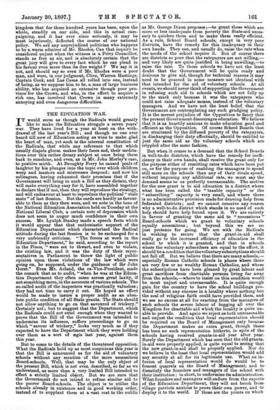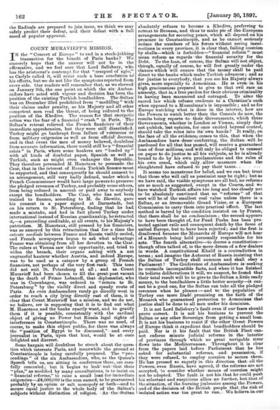THE EDUCATION WAR.
IT would seem as though the Radicals would greatly like to make the Education struggle a seven years' war. They have lived for a year at least on the with- drawal of the last year's Bill ; and though no one ever heard till now of Education acting as wine to make glad the heart of man, yet such is the internal constitution of the Radicals, that while any reference to that which usually dispels gloom makes their faces sad, their medita- tions over this rather dreary subject at once bring them back to sunshine, and even, as in Mr. John Morley's case, to positive mirth. At Broughty Ferry he caused peals of laughter by his plunges into the topic over which children weep and masters and mistresses despond; and now his colleagues, having exhausted their promises that if the Government will bring in such a Bill as they dictate, they will make everything easy for it, have assembled together to declare that if not, then they will reproduce the strategy, and will endeavour at least to reproduce the political "stale mate" of last Session. But the cards are hardly as favour- able to them as they then were, and we note in the tune of the National Education Association held on Tuesday at the National Liberal Club, a certain note of depression which does not seem to augur much confidence in their own success. Mr. Lyulph Stanley made a speech from which it would appear that that enthusiastic support of the Education Department which characterised the Radical attitude during the last Session is to be exchanged for a very unfriendly criticism. "The forces at work in the Education Department," he said, according to the report in the Times, "were set to thwart, and even to violate, the existing law, and it was the duty of their repre- sentatives in Parliament to throw the light of public opinion upon those violations of the law which were going on, he supposed, under the guidance of Sir John Gorst." Even Mr. Acland, the ex-Vice-President, made the remark that as to audit, "when he was at the Educa- tion Department they often came across great laxity, if not something more, in the accounts of various schools. The so-called audit of the inspectors was practically valueless ; they had not time to carry it out. He hoped an effort would be made to insure a proper audit as an abso- lute public condition of all State grants. The State should not allow anything to go on that savoured of trickery." Certainly not ; but to suggest that the Department, which the Radicals could not extol enough when they wanted to prove that the Bill of the Government was intended to undermine its influence, suffers proceedings to go on which "savour of trickery," looks very much as if they expected to have the Department which they were holding over them as a sort of tegis last year, against them this year.
But to come to the details of the threatened opposition. What the Radicals hold up as most suspicious this year is that the Bill is announced as for the aid of voluntary schools without any mention of the more necessitous Board-schools. Well, that may be the only object of the present Bill, which is not even described, so far as we understand, as more than a very limited Bill intended to effect a strictly limited object. But we are sure that the Government do not intend to refuse similar aid to the poorer Board-schools. The object is to utilise the schools already in existence and in good working order, instead of to supplant them at a vast cost to the public as Mr. George Dixon proposes ;—to grant those which are more or less inadequate from poverty the State-aid neces- sary to quicken them and to make them really efficient. As a rule, School Board schools, except in very poor districts, have the remedy for this inadequacy in their own hands. They can, and usually do, raise the rate when the needs of the school require it. But of course there are districts so poor that the ratepayers are not willing,— and very likely are quite justified in being unwilling,—to raise the rate. To those schools we have not the least doubt that the Government will be quite ready and desirous to give aid, though for technical reasons it may need to be granted in some measure not identical with that intended for the aid of voluntary schools. At all events, we should never think of supporting the Government in refusing such aid to schools which are not fully up to the mark only because it was the ratepayers who could not raise adequate means, instead of the voluntary managers. And we have not the least belief that the Government are contemplating any such grudging policy. It is the merest prejudice of the Opposition to fancy that the present Government discourages education. We believe that it is as heartily anxious to make education good and efficient as the Opposition. Of course School Boards that are straitened by the diffused poverty of the ratepayers, in discharging their duty effectually, should be entitled to just the same aid as the voluntary schools which are crippled after the same fashion.
But when it comes to a demand that the School Boards in well-to-do districts, which have the remedy for ineffi- ciency in their own hands, shall receive the grant only for the purpose either of remitting rates which have been put on, or for the purpose of enabling the managers to spend still more on the schools than any of their rivals spend, without imposing any additional rate, we must say the demand seems to us perfectly unreasonable. The motive for the new grant is to aid education in a district where what has been called the "taxable capacity" or the " subscribing " capacity is very small, and where there is no administrative provision made for drawing help from federated districts ; and we cannot conceive any reason why a well-to-do district which stands in no need of such help should have help forced upon it. We are entirely in favour of granting the same aid to "necessitous "" Board-schools which we grant to voluntary schools equally necessitous ; but beyond this we see no just pretence for going. We are with the Radicals in wishing to secure that the grant-in-aid shall really go to the increased efficiency of education in the- school to which it is granted, and that in schools. where the voluntary subscribers are equal to the effort, it should be a condition that thevoluntary subscriptions should, not fall off. But we believe that there are many schools,— especially Roman Catholic schools in places where there are very few or no wealthy Roman Catholics, and where the subscriptions have been gleaned by great labour and great sacrifices from charitable persons living far away from the schools,—where to insist on this condition would. be most unjust and unreasonable. It is quite enough gain for the country to have the school buildings pro- vided without any expense in a locality where nothing but the zeal of religious faith could have provided them, and we see no excuse at all for exacting from the managers of snch schools the severe labour of begging all over the Kingdom for charitable aid which the locality is quite un- able to provide. And again we reject as both unreasonable and unjust the condition that local representation should be required on the Board of Management only because the Department makes an extra grant, though there. has been no such representation hitherto, in spite of the schools having received grants-in-aid year after year. Surely the Department which has seen that the old grants- in-aid were properly applied, is quite equal to seeing that the new grant-in-aid shall be properly applied. Nor do we believe in the least that local representation would add any security at all for its legitimate use. What an in- fusion of local representation would do would be to foment quarrels on the Board of Management, and to. dissatisfy the founders and managers of the school with their institution ; in short, to undermine its administration. What founders and managers will endure from the experts. of the Education Department, they will not brook from village patriots anxious to prove their own power, and to display it to the world. If these are the points on which the Radicals are prepared to join issue, we think we may safely predict their defeat, and their defeat with a full meed of popular approval.



















































 Previous page
Previous page